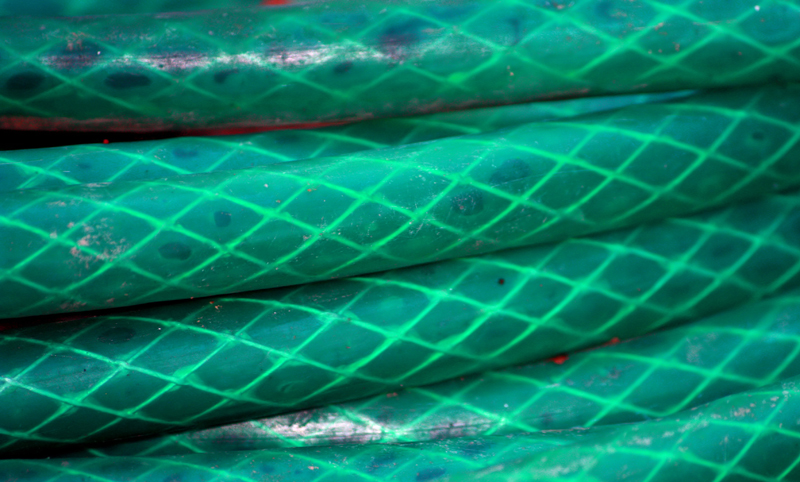Are phthalates in hoses a problem for laminitic horses?

Garden hose.
The “Los Angeles Times” released a report May 4, 2012, titled, “Garden hoses often contain phthalates and lead, study says.”
It includes a lot of information worth discussing in the horse world because many people give their horses water through garden hoses that sit out in the sun, which apparently leads to more phthalates contaminating the water.
I was interested in whether phthalates, which mimic estrogen in the body, could alter the endocrine system of a horse enough to lead to laminitis. Like many of my theories, this one cannot be proved, at least not by me from my farm.
And there may not be one thing leading to laminitis. There may be many things that push a horse over the edge into having elevated insulin and developing laminitis — from getting just a little too much iron though trace mineral blocks to developing elevated estrogen through water ingestion of phthalates to taking in too much sugar and starch by eating grass or hay designed to fatten cows quickly.
The “Times” article on garden hoses says the nonprofit environmental research group HealthyStuff.org in Ann Arbor, Mich., found that the lead and phthalates in water hoses exceeded allowable levels set by the Consumer Product Safety Commission, and the lead in brass fittings for garden hoses exceeded standards for brass fittings in residential water fixtures as set by the federal Safe Drinking Water Act.
The study tested other gardening products, as well, but Jeff Gearhart, research director for HealthyStuff.org, said garden hoses were the one that raised the most concern. Tests indicated that phthalates and bisphenol A migrated out of the hose and into water sitting inside.
“I was surprised at the levels of chemicals and some of the chemicals we found,” Gearhart told the “Times.” “But I was even more surprised that there’s a lot of better choices in the marketplace.”
Gearhart recommended that consumers buy lead-free garden hoses, which he said are often white with a blue stripe and found at marine and RV stores.
For people who use hoses with lead and phthalates, Gearhart suggested letting the hoses run before using them and storing them in the shade to prevent the sun from heating the hose and releasing plastic chemicals into the water.
There are groups of scientists who dispute whether phthalates are a cause for concern at all. Animal studies using phthalates apparently have not cleared up the controversy.
However, the U.S. Department of Health and Human Services has a posting on its website from Dr. John Bucher, associate director of the National Toxicology Program, which summarizes his group’s investigation to the topic in 2008. The report describes bisphenol A, or BPA, the phthalate in garden hoses, as a high-production industrial chemical used to manufacture polycarbonate plastics and epoxy linings of tin cans.
Bucher says BPA “has been known since 1938 to mimic estrogen when given in large amounts to experimental animals. More recently, it has also been studied for its ability at very much lower doses to affect hormonal processes involved in development, when an animal is exposed as a fetus or during infancy.”
He says a CDC study from 2003 to 2004 found detectable levels of BPA in 93 percent of 2,517 urine samples from people 6 years and older in the United States.
He went on to say: “We express ‘some concern’ that current estimated exposures of BPA to fetuses, infants, and children could cause neural and behavioral effects, effects on the prostate and mammary gland, and an earlier age at which females attain puberty. We express “negligible concern” or “minimal concern” that current exposures to BPA could cause adverse health effects in other segments of the population.”
I did a previous post on young girls developing earlier if you want to read more on that topic.
Bucher said there are a number of uncertainties in the scientific information on BPA. The literature from experimental animal studies is large but conflicting, and human studies are insufficient.
So, where does this leave horse owners?
A lead-free hose won’t solve the phthalate problem.
My water well is so far from my shed that I can’t get water from one place to another without a hose unless I want to invest a lot of money in piping. Actually, if I had the money, I’d do it.
I have always noticed that the water had a bad taste to it in summer that wasn’t there in the winter, and new hoses have a bad taste, as well. So, the “Times” article more confirms my suspicions than surprises me. The hose is tainting the water. And the water is more tainted in the summer, when horses drink more water.
Is this enough to change a horse’s estrogen level to a level that effects the horse’s insulin level? We know estrogen can effect insulin levels.
I find no studies on hose water and horses on Google Scholar. There are so many unanswered questions that it’s maddening for those of us who need answers now to save our laminitic horses. Where are we going to get these answers?